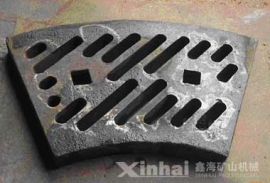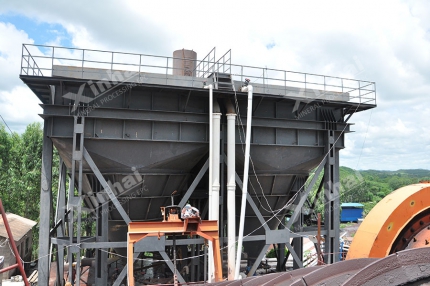Thickener is the common mineral processing equipment in the mineral processing plant, which is widely used in the concentration and dewatering of the mineral processing plant. However, in the practical operation, the fault rate of the thickener is up to 37%. Therefore, daily maintenance is the key point to reduce the fault rate of thickener in mineral processing.
The daily maintenance is responsible for full-time staff. His job is the daily check, machine lubrication, preventive maintenance, and other maintenance. Besides, thickener maintenance personnel should keep the thickener stable operation and deal with urgent accidents.
Use the table of contents below to navigate through the guide:
01Daily Check of Thickener
The daily check is the essential check work for every large piece of equipment. The thickener operator should understand the structure, performance, specifications, name, and the role of each part, and be familiar with the whole flow of thickener operation, to carry out the maintenance.

The check content mainly includes:
1. Check the the bolt fastening condition of each part of the thickener, whether the operation is stable, whether there is vibration, noise, and other phenomena;
2. Check the bearing temperature of the motor and reducer. The temperature rise shall not exceed 40 ℃. If exceed, need to find out the reason, add lubricating grease (oil) or replace the bearing, if the temperature rise caused by excessive load, should appropriate rake;
3. Check the temperature of the motor and reducer bearing, the temperature should be less than 40 degrees centigrade. If the temperature is over, the reason should be found. Add lubrication oil or change bearing, if the overload causes temperature rising, the rake plane should be rose appropriately;
4. Check whether the viscosity and oil level of the lubricating oil meet the requirements. If the viscosity is too low, timely oil change; If the oil level is lower than the middle of the oil window, timely oil injection is required; If the oil level is seriously low, the possibility of oil leakage should be considered, the cause of oil leakage should be found, the replacement of seals, etc.;
5. Check whether the limit mechanism such as travel switch is out of order;
If thickener maintenance personnel found the above questions, they should be dealt with and stopped, and report to superiors.

02Machine Lubrication for Thickener
The thickener lubrication management is a key point of thickener normal operation. The thickener operator should properly, reasonably and timely lubricate the thickener, check the oil level of the tank every day, and replenish it when necessary. It is important to note that the lubricating oil used at different lubrication points is different, and the oil also varies according to the season.

For example, the lubricating oil grade of hydraulic drive thickener is as follows:
1. The oil for the hydraulic motor reducer is L-CKC-220 industrial gear oil.
2. The inner oil for the reducer box is L-CKC-460 industrial gear oil.
3. In the hydraulic station, the oil is HM46 anti-wear hydraulic oil in summer and HM32 anti-wear hydraulic oil in winter.
Attention: all the lubrication points should change to new oil after the first operation with oil for a week. Later, the oil should be changed every half month. The thickener operator should daily check the oil position and add oil in time.
03Preventive Maintenance for Thickener
Taking peripheral drive thickener as an example, the main check includes:
1. Regular maintenance of concentrator fasteners, driving rack, slideway levelness.
2. Regular maintenance of the rotary harrow and the harrowing track, to ensure that the diameter error of the center circle of the track is no more than ±5mm, to ensure that the top surface of the two sections of the track joint is on the same plane (the error is no more than 0.5mm, and the roughness of each end of the track is no more than 1.5mm).
3. Check the wear of the supporting roller, roller bearing and transmission gear regularly, and replace the surface or directly if necessary.
4. Regularly check pulp pipe, center barrel, trough frame, drive frame, concentrator harrow frame, replace or repair damaged parts in time.
5. Check motor current change regularly. In case of big changes, check the operation of each component in time.
Thickener repair period
Types | Period | Content |
Quick repair | 4000 | Empty the slurry in the concentrator, check whether the tank is damaged;
Overhaul the rake rake mechanism is in good condition, check the rake wear;
Check the wear of transmission mechanism, replace the bearing with heavy wear;
Replace lubricating oil and grease; Check whether the limit mechanism fails;
Check all welds are in good condition; |
Large repair | 8000 | Check fastening anchor bolts; Check the external surface of the tank for oil leakage;
Clean dirt and sundries on the track;
Remove leaks and drips from valves and joints;
Minor repair of all items, replacement of bearings, gears, etc. |
04Accident and Emergency Solution for Thickener
In the daily operation of thickener, there may be some emergency, if not handled properly, it will affect the efficiency of the whole plant, which requires the thickener operators to be able to find out the problem in time and deal with it properly.

Common faults and emergency solutions
Common faults | Emergency solutions |
Pressing rakes | It is caused by slurry line blockage or prolonged shutdown
The feeding should be stopped and washed by water with pressure 0.5-0.8MPa. Drain some of the pulp, then run the rake until the rake can run normally. |
Muddy | Adjust the levelness of zigzag overflow dam;
Check whether there is any leakage in the feed pipe before it enters the central cylinder, breaking the calm of the liquid level and generating eddies.
If the settlement area is not enough or difficult to settle minerals in a short time (such as high mud content), add flocculant to accelerate the settlement speed;
Check whether there is shaking in the operation of the equipment, whether the shaking breaks the calm of the liquid level and affects the settlement;
Mine discharge quantity is not enough, increase mine discharge quantity. |
High material concentration | Increase the discharge quantity. |
Pressure bearing has abnormal sound | Stop and check to make sure all lubrication points are lubricated properly. |
Oil pump misdirection | It may be that there is air in the tubing and the rotation direction of the oil pump needs to be changed. |
To guarantee the normal operation in the mineral processing plant and keep a high working efficiency, maintenance and check are essential. For the mineral processing plant, on the one hand, we suggest looking for mill plant overall aptitude equipment manufacturers buy thickener. On the other hand suggested thickener operating and maintenance staff improve their skills, pay more attention in the operation of the thickener, encounter problems after calm analysis reasons and take corresponding measures, timely deal with an emergency situation, to ensure smooth production of the processing plant, avoid unnecessary economic losses.
05Xinhai Mining - Thickener Application
1.Tanzania 1200tpd gold processing plant

2.Gansu 1000tpd gold processing plant

3.Malaysia 700tpd gold processing plant

4.Zimbabwe 700tpd gold processing plant

5.Morocco 500tpd silver processing plant



 marketing@ytxinhai.com
marketing@ytxinhai.com  0086 13810327080
0086 13810327080 






































































































 CHAT
CHAT MESSAGE
MESSAGE










